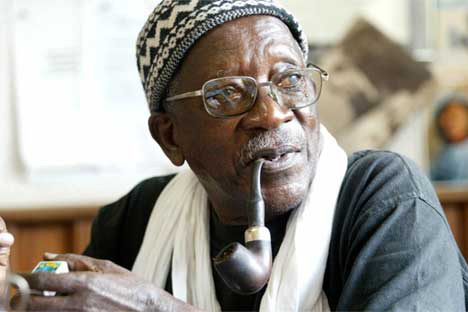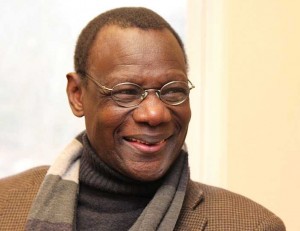A film festival highlighting the work of African filmmaker Ousmane Sembène, including a documentary selected for the Sundance Film Festival, will be held March 29-31 at Illinois Wesleyan University.
Born in 1923 in Senegal, Sembène has often been called “the father of African film.” A fifth-grade dropout, Sembène was a self-taught novelist before he realized films would reach wider African audiences. Over a nearly 40-year film career, Sembène tackled recurring themes of the history of colonialism, the failings of religion, critique of the new African bourgeoisie, and the strength of African women. His final film, the 2004 feature Moolaadé, explored the subject of female genital mutilation and won awards at the Cannes Film Festival. Sembène died in 2007.
The filmmaker is the subject of the documentary Sembène! , which was screened in 2015 at the Sundance, Telluride and Cannes film festivals. Sembène! is told through the experiences of the man who knew him best: his biographer Samba Gadjigo, who co-wrote, co-directed and co-produced the documentary.
Sembène! will be screened March 31 at 4 p.m. at Illinois Wesleyan. Gadjigo, who is also a professor of African studies and French at Mount Holyoke College, will lead a discussion of the film at its conclusion. In a review of Sembène!, The Hollywood Reporter called it “a welcome spotlight on the legendary Senegalese director.”
Sembène films to be shown at IWU include Faat Kine on March 29 and Mandabi (The Money Order) on March 30. A 1968 film exploring themes of neocolonialism, religion,
corruption and relationships to Senegalese society, Mandabi will be shown March 30 at 4 p.m.
Sembène’s film Faat Kiné, set in the present day, provides a critical look at modern, post-colonial Senegal and the place of women in that society and will be shown March 29 at 7 p.m. All screenings will take place in The Ames Library’s Beckman Auditorium, and are free and open to the public.
The Sembène Film Festival is sponsored by Illinois Wesleyan’s Center for Human Rights and Social Justice with the assistance of a Re-Centering the Humanities Mellon Foundation grant.


